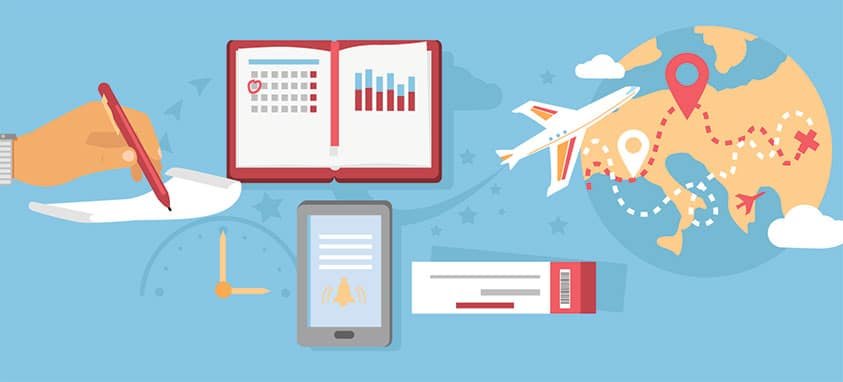Role of Artificial Intelligence in Transforming Travel industry
In the digital age, the travel industry is transforming, driven by the integration of artificial intelligence (AI). Gone are the days of generic travel recommendations; today, AI is revolutionizing the way we explore and experience the world. This article delves into the realm of AI-powered travel insights, exploring how machine learning algorithms and data analytics are reshaping travel recommendations and enhancing the overall travel experience. So here you will learn the Role of Artificial Intelligence in the Transforming Travel industry.

Role of Artificial Intelligence in Transforming the Travel Industry
-
The Current Landscape of Travel Recommendations:
-
Challenges with Traditional Approaches:
Traditional travel recommendations often rely on generic algorithms that consider factors like location popularity, historical booking data, and basic user preferences. While these approaches can provide some guidance, they often fall short in delivering personalized and nuanced recommendations that cater to the unique preferences and interests of corporate and individual travellers.
-
Shift towards Personalization:
As Corporate travellers increasingly seek unique and personalized experiences, the travel industry is recognizing the need to move beyond one-size-fits-all recommendations. AI technologies, particularly machine learning, have emerged as a powerful tool for deciphering the complexities of individual preferences, enabling the delivery of tailored travel recommendations that resonate with each traveler’s unique desires.
-
-
Leveraging AI for Personalized Travel Insights:
-
Machine Learning Algorithms:
Machine learning algorithms form the backbone of AI-powered travel recommendations. These algorithms analyze vast datasets, including user behaviour, historical travel patterns, and real-time information, to identify patterns and preferences. Through continuous learning, these algorithms evolve, becoming more adept at predicting individual preferences and delivering personalized travel insights.
-
Natural Language Processing (NLP):
Natural Language Processing is another key AI component transforming travel recommendations. By understanding and interpreting human language, NLP allows travel platforms to analyze reviews, comments, and social media posts related to destinations, accommodations, and activities. This sentiment analysis enables the extraction of valuable insights into the experiences of other travellers, contributing to more informed and nuanced recommendations.
-
Predictive Analytics:
Predictive analytics utilize historical data and machine learning models to forecast future trends and behaviours. In the context of travel, these insights help platforms anticipate the preferences of individual travellers based on their past behaviours. This proactive approach ensures that recommendations are not only personalized but also forward-looking, aligning with evolving traveller preferences.
-
-
Enhancing User Experience with AI-Powered Insights
-
Tailored Destination Recommendations:
AI enables platforms to deliver highly tailored destination recommendations by considering a multitude of factors. These include past travel history, preferred activities, climate preferences, and even real-time factors like local events and festivals. The result is a curated list of destinations that align with the traveller’s unique interests, fostering a sense of anticipation and excitement.
-
Accommodation and Dining Suggestions:
AI-driven recommendations extend beyond destinations to include personalized suggestions for accommodations and dining. By analyzing user reviews, preferences, and real-time availability, AI algorithms can recommend hotels, vacation rentals, and restaurants that align with the traveller’s tastes and preferences. This level of personalization enhances the overall travel experience, ensuring that every aspect of the journey resonates with the individual. Service apartments in Mumbai offered by PAJASA always use AI for property recommendations to it its corporate
-
Activity Planning:
The days of generic travel itineraries are fading away, thanks to AI-powered activity planning. By understanding a traveller’s interests, whether they are inclined towards adventure sports, cultural experiences, or leisurely exploration, AI can craft personalized activity plans. These plans not only consider the traveller’s preferences but also optimize for factors like travel time, opening hours, and local events.
-
-
Overcoming Challenges and Concerns:
-
Data Privacy and Security:
As AI relies heavily on data, concerns regarding privacy and security have surfaced. Travel platforms employing AI must prioritize robust data protection measures, ensuring that user information is handled responsibly and ethically. Transparent policies and user consent mechanisms are crucial in building trust and addressing concerns related to data privacy.
-
Avoiding Algorithmic Bias:
Algorithmic bias is a potential pitfall in AI-driven systems, as algorithms may inadvertently reflect the biases present in the data they are trained on. To ensure fair and unbiased recommendations, developers must actively work to identify and mitigate any biases in the algorithms. Regular audits, diverse training datasets, and ongoing refinement are essential to create AI systems that deliver equitable recommendations for all users.
-
-
The Future of AI-Powered Travel Recommendations:
-
Continuous Learning and Evolution:
AI’s strength lies in its ability to learn and adapt over time. Future travel recommendation systems will likely employ advanced machine learning models that continuously refine their understanding of individual preferences. These systems will adapt to changing traveller behaviours, evolving trends, and emerging destinations, ensuring that recommendations remain relevant and enticing.
-
Integration of Augmented Reality (AR) and Virtual Reality (VR):
The integration of AR and VR technologies holds great promise for the future of travel recommendations. Imagine a traveller being able to virtually explore a destination, experience potential activities, or even “try-out” accommodations through immersive simulations. AI algorithms will play a crucial role in personalizing these virtual experiences, providing a preview that goes beyond static images and written descriptions.
-
Collaboration with Local Communities:
Future AI-powered travel platforms may prioritize collaboration with local communities to enrich recommendations. By incorporating insights from residents and businesses within a destination, travel platforms can offer authentic and culturally immersive experiences. This collaborative approach ensures that recommendations align with the values and practices of the local community, fostering sustainable and responsible tourism.
-
Case Studies:
-
Google’s Travel Recommendations:
Google utilizes AI to enhance its travel services, offering personalized recommendations through its Google Travel platform. By analyzing past searches, bookings, and preferences, Google provides tailored destination suggestions. It includes activity recommendations and even notifies users of price drops for flights and accommodations.
-
TripAdvisor’s AI-Driven Experiences:
TripAdvisor leverages AI to enhance its Experiences platform. Through machine learning algorithms, TripAdvisor tailors activity recommendations based on user preferences and behaviours. The platform’s use of NLP also enables sentiment analysis of reviews, helping users make informed decisions about the experiences they choose.
AI-powered travel recommendations represent a paradigm shift in how we plan, experience, and cherish our journeys. The marriage of machine learning, natural language processing, and predictive analytics has ushered in an era of unprecedented personalization, where every travel recommendation is uniquely crafted to align with individual preferences. hope you find the Role of Artificial Intelligence in transforming the travel industry.
